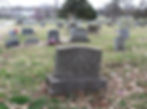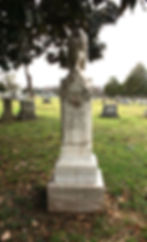Historic Greenwood Cemetery, Nashville
- lvenegas13
- Apr 5, 2023
- 5 min read
Updated: Apr 6, 2025
1429 Elm Hill Pike, Nashville, TN, 37210
African American Cemetery

Stepping into the historic Greenwood Cemetery in Nashville was unlike my experiences in other cemeteries. I’ve been to historic graveyards that had extraordinary monuments, and those that are so old that simple stones are the only markers left. Greenwood is not ostentatious, although there are some beautiful headstones, nor is it solely markers, but I believe it may be one of the most complex cemeteries I’ve ever been to.
First, let’s get some of the history out of the way. According to its website, the cemetery was established in 1888 by the remarkable Preston Taylor. Taylor was born a slave in 1849 and even served as a Union Army drummer boy, yet from these humble beginnings he became one of Nashville’s early black millionaires. He began his ministry in his 20’s by founding a church in Mt. Sterling, Kentucky, before moving to Nashville; preaching in several churches before helping establish Lea Avenue Christian Church and the National Colored Christian Missionary Convention. Taylor’s name can be seen all over Nashville due to his resolve to improving the social and economic conditions of African Americans. For example, when blacks were prohibited from entertainment venues, he purchased land and opened Greenwood Park, the first recreational park for Nashville’s black community. He also established One Cent Bank (now Citizens Savings & Trust) and Tennessee State A&I Normal School (now Tennessee State University) – all this while under Jim Crow laws!


Here is an important point: Taylor’s creation of a dedicated cemetery for black people was an incredible endeavor for several reasons. Prior to emancipation, slaves were often buried on white family and church cemeteries or their owners’ properties, usually in remote spots, among trees and underbrush. Graves were often kept out of sight, marked only by simple stone or wooden slabs that rotted away. It’s also sobering to consider that for blacks, being buried on their owner’s property was the final affront after a life lived with spiritual, if not physical, shackles. And while the Nashville City Cemetery started in 1822 welcomed both black and white from its onset, Jim Crow laws enacted after the Civil War separated the races after death. Think about this for a minute. Where now was a black person to be buried that would honor and respect their journeys, regardless of their positions in life? This may be what prompted Taylor to purchase a 37-acre site in 1888 on Elm Hill Pike and Spence Lane to open Greenwood Cemetery so that Blacks could have an “first class burial space… available at cost.” This was only the second cemetery in Nashville for African Americans. (Mt. Ararat was established in 1869 by and for African Americans, and would be acquired by Greenwood Cemetery in 1983. It is one mile west of Greenwood and has a fascinating history as well that we’ll explore in the future.)

Now to my musings about this important location... The first grave you see is Preston Taylor’s, and this seems like the largest in the entire cemetery. From here many of the graves are modest, even those of its most famous residents (see list below of notable graves). It was the old graves that held my interest the most. I saw their simplicity and often degraded state and wondered about the people buried there, who may not have had much but were able to reserve space in a place that would honor and respect their journeys, despite (and here because of) their color. I began to consider the reasons why I found this a heavy emotion and acknowledged that I was a White woman (true, half Caucasian/half Hispanic, but still) who seemed to take it for granted that people could have a place chosen by them for a burial; and yet clearly, in front of me, were markers that said this was not always the case. I stood in front of Viola Hyde’s grave and wondered who she had been. Had she been a slave? How did she come to be buried here, and how important was this to her and her family?
There are also newer graves scattered among the old, which doesn’t always happen in historic cemeteries. I was suddenly reminded me that real people, with real lives of happiness and suffering, who lived not so long ago are buried here. I felt true sadness and had to acknowledge these emotions for a moment. Up to now I’ve been able to mentally partition old graves as “historical” in order to protect myself emotionally, but that wall was crumbling by the second. (I have lost too many loved ones in the last eight years, and so putting up a defensive wall to enter graveyards is my coping mechanism, I guess.) I found myself gazing at the markers and headstones and wondering about personal stories, empathizing with suffering, marveling at the individuals who wish to be respected and remembered long after their death. I see people in the distance placing flowers on a grave and can almost sense the heartache and loneliness they must feel. It is a reminder that the reason cemeteries exist at all is to create Sacred Ground where we can honor, revere and devote ourselves to their memories. Visiting Greenwood invites you to share this perspective from the African American viewpoint, which in this day and age can surely help further the empathy we need.
Famous graves at Historic Greenwood Cemetery, Nashville (main cemetery):
Preston Taylor - One of Nashville's first black millionaires and founder of Greenwood Cemetery.
Georgia Gordon Taylor – Wife of Preston Taylor and a renown Fisk University Jubilee Singer.
DeFord Bailey – Musician and Country Music Hall of Fame Member. The “Harmonica Wizard.”
Arna Wendell Bontemps – Poet, novelist, editor and children’s book author.
Mattie Eliza Howard Coleman – one of the first black women to become a physician and the first president of the Women’s Missionary Council, Christian Methodist Episcopal Church.
Mary Lena Tate – founder of the Church of the Living God, the Pillar and Ground of the Truth, Inc.
Adolphus Anthony “Doc” Cheatham – Jazz trumpeter who recorded with Billie Holiday, Ma Rainey, Herbie Man, Cab Calloway and many others.
Rev. John Braden - President of Central Tennessee College and originator of Meharry Medical College.
Note: The other Greenwood Cemetery at 820 Elm Hill Pike, formerly Mt. Ararat, also has notable graves and is worth going to while you’re in the neighborhood!

If you’d like to find additional black cemeteries in Tennessee, here is a resource worth exploring: Tennessee African American Cemeteries | Access Genealogy.
Greenwood Cemetery is operated by the National Christian Missionary Convention of the Christian Church (Disciples of Christ) and is a nonprofit organization. For information on this nonprofit, and to donate to the organization for the upkeep of these historic graveyards, please follow this link: National Christian Missionary Convention Archives - Christian Church (Disciples of Christ).
If you have stories to share about those buried at Greenwood, or have suggestions about other African American cemeteries, please comment below!
If you would like to read about another historic African American cemetery with an important past, see Zion Presbyterian Church and Cemetery in Columbia.
REFERENCES (with Links)













